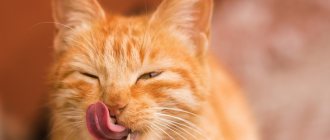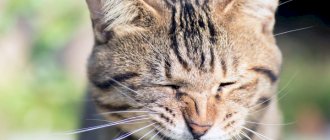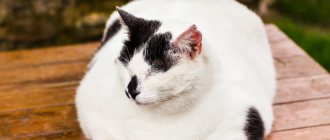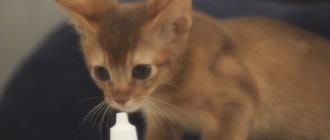If a cat is breathing with its mouth open, there may be natural physiological or pathological reasons for this. Conditions in which a cat suffocates are poisoning, overheating, injuries to internal organs, neoplasms or a foreign body in the nasopharynx, allergies, diseases of the heart and respiratory system. The owner must know what alarming symptoms are and be able to provide first aid. A veterinary clinic specialist will conduct a diagnosis and determine the reason why the cat is sticking out its tongue.
According to veterinarian statistics, 10% of cats with breathing problems are diagnosed with cardiovascular diseases.
Why does a cat breathe through its mouth?
The reasons why a cat opens its mouth and breathes like a dog with its tongue hanging out are:
- Physiological, when rapid breathing is caused by natural processes in the body.
- Pathological, in which the cat breathes with its mouth open due to illness or injury.
Physiological reasons
A cat breathes through its mouth under the following circumstances:
If the female is expecting offspring, then such a symptom is a sign of imminent delivery.
- Physical exercise. In kittens and adult cats, the frequency of breathing increases after too active games or running. When a pet runs, a lot of energy is consumed and all organs begin to function faster. The body needs an increased amount of oxygen, since cats do not know how to accumulate it. Therefore, if the cat has been running, it breathes quickly and its tongue sticks out.
- Dream. During the deep sleep phase, all the cat’s muscles relax, including the maxillofacial muscles. This causes the jaw to drop and the tongue to stick out. The Maine Coon sleeps so often, which is considered a feature of the breed. If a cat sleeps with its tongue hanging out and makes a sound, this is natural. Kittens sleep and show their tongues because they have a strong sucking instinct.
- Pregnancy and childbirth. If a pregnant cat breathes through her mouth, this means that the fetuses are pressing on the diaphragm and it is difficult for her to breathe. Mouth breathing indicates the beginning of contractions. The female walks restlessly, meows, and looks for a comfortable place. If heavy breathing appears after childbirth, this may be the onset of eclampsia and the animal needs emergency veterinary care.
- Stress. Adrenaline is released into the blood, causing the heart to work harder and breathing to increase.
- Death. In a state of agony, the cat sticks out its tongue and often breathes through its mouth. When a pet dies, the heart begins to contract worse, causing hypoxia.
Pathological factors
Poisoning
A smoking owner with his bad habit can provoke such a manifestation of smoke poisoning in his pet.
If a cat is breathing heavily and opens its mouth slightly, this may indicate that toxic substances have entered the body: alkalis, acids, rodent poisons, household chemicals, medications that the pet accidentally swallowed. A cat can also be poisoned by gas, combustion waste, even nicotine if the owner smokes a lot indoors.
Overheating
In hot weather, animals often overheat, especially if the owner leaves the pet in the car or on a closed balcony. Most often, long-haired cats suffer - Persian, Angora, Siberian. Hairless breeds also overheat and stick out the tip of their tongue. Therefore, in the summer, you should purchase a cooling mat for your pet.
Internal organ injuries
This is a deadly condition in which there may be no external changes. The cat pulls out its tongue and begins to breathe through its mouth after a fall from a height, a car injury, broken ribs, a ruptured diaphragm, or traumatic brain injury. With such pathologies, pulmonary edema often develops, which often provokes death. And also a protruding tongue indicates an accumulation of fluid in the pleural area.
Polyps in the nasopharynx or foreign body
A cat breathes heavily with its mouth open if there are polypous processes in the nose and nasal inhalation is difficult. Polyps grow, occupying the space of the nasopharynx, which is why the cat wheezes and the mouth opens even in sleep. Small objects that the animal sniffs also accidentally get into the nasal sinuses. A foreign body sometimes gets stuck in the throat (fish bones, fragments of toys).
Allergic reaction
If a cat constantly sticks out its tongue, watery eyes, itchy skin, swelling of the throat or mucous membranes appear, this is the immune system’s response to the allergen. The level of histamine increases, which dilates blood vessels, causing respiratory activity to become more frequent. Main agents:
- nutritional supplements;
- household chemicals;
- cosmetics for cats and people;
- medicines;
- dairy products;
- helminths and skin parasites.
Diseases of the heart and respiratory system
The cause of this pathology may be helminths - heartworms.
The cat's tongue sticks out and difficulty breathing occurs with cardiomyopathy, when the structures of the organ thicken, disrupting coronary blood flow. Dirofilariasis is dangerous, in which worms are localized in the cavity of the heart. Often, a cat breathes through its mouth due to pathologies of the respiratory system - pneumonia, bronchitis, pulmonary thromboembolism, laryngeal stenosis.
Diagnostics
To understand why an animal opens its mouth when breathing, it is necessary to closely monitor it for several days. This will help your veterinarian determine the exact cause. In this case, you should pay attention:
- On the general condition of the cat, appetite, activity, trips to the toilet and stool consistency.
- Is this condition accompanied by vomiting or coughing?
- After which this phenomenon occurs, perhaps it is preceded by active games or other physical activity.
- How often does this happen - constantly or at regular intervals?
In any case, with this symptom, contacting a veterinary institution is mandatory. The doctor will conduct an in-person examination and collect anamnesis, and will prescribe appropriate diagnostic measures, which include:
- Blood sampling for general and biochemical analysis.
- Chest X-ray.
- Electrocardiogram of the heart.
- Ultrasonography.
- Diagnosis of infectious diseases.
- Bronchoscopy and rhinoscopy.
- Consultations for the presence of tumor formations of the respiratory system.
What to do if a cat pulls out its tongue?
A sufficient volume of water is an important condition for improving the condition of the animal when overheated.
When a cat sticks out its tongue due to a foreign body, it should be carefully removed. The object is pulled out with tweezers. If a foreign object has moved strongly into the trachea, the animal should be turned upside down with its hind legs and shaken a little. If the cat overheats, place it in a cool place and give it plenty of water. In other cases, emergency veterinary care is always required.
First emergency aid
If the owner witnesses that the animal is suffering from heavy and irregular breathing, especially if it is lethargic and apathetic, refuses to eat, and prefers to rest more, this may indicate that the situation requires emergency measures. First you need to find the reason why this happens. You should carefully examine the cat, check if it has wounds, fractures or other mechanical damage. If this condition is accompanied by vomiting, it is necessary to pay attention to the consistency of the vomit and feces, the presence of mucous or bloody discharge in them.
Be sure to consider what your cat has been eating lately. It happens that a cat ingests certain medications or chemicals that can cause poisoning. The sooner it is determined what exactly caused the animal’s intoxication, the greater the chance of receiving adequate treatment.
In any situation, the animal should not be disturbed too much. It is necessary to take measures to limit his drinking and food intake, and contact a veterinary clinic. Many veterinary institutions provide free consultations over the phone. Such consultation can save a cat's life.
How to deliver a pet to a medical facility?
If there is a need to go to a specialized institution, you should follow the rules for transporting the animal. If the pet is unconscious, then during transportation it should be placed on its right side, with its neck and tongue extended.
If the animal is in a conscious state, it has all the signs of vital activity, it must be transported in a special basket or cardboard box, the bottom of which must be lined with something soft. Ideally, he should be accompanied by the owner.
It is worth noting that many modern veterinary clinics are equipped with ambulance services. Therefore, if the pet’s condition is extremely serious, then it is better to use just such a service.
Breathing through the mouth for a cat is not physiological and characteristic. Most often it occurs as a result of certain pathological conditions, which can be quite dangerous and lead to tragic consequences. For this reason, you need to immediately determine why exactly this is happening. Timely, correctly provided assistance will make it possible to maintain health, and sometimes even the life of a pet depends on it. A loving owner must understand that not in all cases it is possible to solve the problem on your own, especially in difficult situations. For this reason, the best option is qualified assistance in a veterinary hospital, where the cat will have to be transported independently in a carrier or in a cardboard box.
If it is not possible to immediately deliver the cat to the clinic for diagnosis, then you can use a telephone consultation. Many modern specialized organizations provide the service of visiting a veterinarian at home. This makes it possible to provide assistance to animals in the most urgent and unforeseen situations that require the use of emergency measures aimed at saving the pet.
Detailed overview of possible problems
If an adult cat is breathing heavily with its tongue hanging out, then this is a serious signal to the owner to take his pet for a detailed examination. Especially if this condition occurs during the cold season. Additional symptoms may also include grunting, sniffling and whistling while breathing at rest. In some cases, shortness of breath may be observed even with minimal physical exertion, and increased salivation will once again confirm serious malfunctions within the animal’s body. The veterinarian will necessarily consider the following possible pathologies:
Asthma. It occurs to varying degrees of severity in cats of all ages. Most often it is detected in the first year of an animal’s life, but there are many cases where pregnancy or injury could activate the process even in adult pets. At the initial stage, symptoms may be barely noticeable and appear only after intense physical exertion or during the hot season. Subsequently, the cat begins to breathe heavily with its tongue hanging out, and a cough may appear. Lethargy and lack of appetite may be associated with shortness of breath and other breathing problems. The diagnosis is made on the basis of a lateral X-ray of the lungs and a clinical blood test, where an increased number of eosinophils will be detected. Treatment will largely depend on the severity of symptoms. In most cases, asthma occurs more than once during a lifetime, and in animals that experience attacks more than 2-4 times a year, hormonal therapy and glucocorticoids are prescribed throughout their lives. Heart pathologies. There are breeds (Maine Coons, Persians, Exotics, Sphinxes) that have a congenital predisposition to heart defects, which in most cases appear in the first year of life. You can suspect heart problems in an animal by shortness of breath, which can be observed even at rest, paroxysmal cough and blue discoloration of the mucous membranes of the mouth. It is especially dangerous when the cat breathes with its mouth open and tongue hanging out without any provoking factors. Cardiac pathologies can be excluded or confirmed using ECHO. Treatment in each case is individual, depending on the severity of the symptoms. In most cases, heart defects require lifelong care for your pet, not only medically, but also behaviorally (exclusion of physical activity, proper nutrition, etc.). Heatstroke. It is more common in dogs, but cats that travel by car are also at risk. Animals can tolerate even the most extreme air temperatures, provided they have the opportunity to find a cool place. If your pet is locked in a car, even on a not-so-hot day, there is a risk of heatstroke. If, after a long stay indoors in extreme heat, the cat is breathing with its tongue hanging out, its coordination of movements is impaired, vomiting and diarrhea are observed, then you should immediately take the animal to the nearest veterinary clinic to provide the necessary assistance. Some owners try to cool their pet on their own, but this is very dangerous, so you need to be careful and stop in time (we are talking about applying cold to the hips and paw pads). Even if the temperature has completely returned to normal, it is better to show the cat to the veterinarian to exclude possible complications in the future. And remember that you can only provide first aid if you are sure that the animal has heatstroke, and not pulmonary edema or other pathologies associated with the heart or respiratory tract. Pulmonary edema. Very common in chronic heart failure and after serious injuries received in accidents or falls from great heights. If the cat is breathing with its tongue hanging out or is acting restless (and this has never been noticed before), then it is recommended to take it to the veterinary clinic for an x-ray. If pulmonary edema is confirmed, an oxygen chamber and intravenous injections may be needed
But it is important to remember that relieving edema without eliminating the root cause that provokes it does not make sense.
In conclusion, I would like to remind you that large cats after physical exertion or during the hot season can breathe with their mouths open and their tongue hanging out. But, at rest, even in the largest pets, heavy breathing should be alarming.
Animal Treatment Options
In most cases, the best option would be to urgently hospitalize your furry. There is no need to try to cure a tailed cat at home. By trying to help the poor cat on their own, the owners are only stalling for time and making the situation worse.
Contacting a veterinarian
When contacting a veterinary clinic with complaints of unnatural breathing of a pet, the doctor will prescribe the following tests:
- ECG of the heart;
- Ultrasound of the heart;
- blood test (general, biochemistry, for infections: herpes, rhinotracheitis, etc.);
- fluoroscopy;
- consultation with veterinarians: oncologist, dentist and surgeon;
- bronchoscopy;
- rhinoscopy.
The list of studies is impressive, but despite this, loving and responsible owners will do everything necessary to ensure that the four-legged disease is diagnosed on time. This will increase the chances of a speedy recovery for your pet and its return to its former carefree cat life. Therefore, at the slightest suspicion of illness in your tailed friend, you must call a doctor at home or take the cat to the hospital.
If a foreign object is stuck in your pet's nose, to provide first aid you need to open the cat's mouth wide, then pull his tongue and try to stick the object out with tweezers. If he ends up in the trachea, you need to follow these steps: turn the cat over, then lift him by the hind legs and gently press his stomach in the diaphragm area. After such manipulations, the foreign object should jump out. But if this does not happen, the cat must be urgently transported to the veterinary clinic.
How to determine whether it is normal or pathological
In order to understand what is happening to the pet, whether a protruding tongue is a normal physiological reaction or a pathology, experienced veterinarians recommend touching the tip of the cat’s tongue with your finger.
If it immediately retracts into place, then there is no cause for serious concern. When the cat initially hid his tongue, and after a short time began breathing through his open mouth again, it is better to go to the clinic.
Although professional breeders first examine the pet themselves:
- Mouth - for stuck objects and ulcers (gingivitis or stomatitis).
- Eyes - whether there is conjunctivitis or lacrimation.
- Nose—stuffiness or mucus discharge.
- Ears, tail, paws, whole body.
In addition, they check the general reactions of the body and measure the temperature.
Pathological causes
It happens that owners observe breathing problems in their cat for quite a long time. However, the factors from the above list are absent. Why, in this case, can the cat breathe heavily, often, sticking out its tongue? Here are the most common dysfunctions in which this symptom appears :
- a foreign body that has entered the respiratory tract and blocked the air supply;
- painful lesions of the oral mucosa (mechanical damage, ulcers, rashes, fistulas, inflammation);
- ARVI and similar ailments, in which mucus accumulates in the nose and other parts of the respiratory tract (oxygen is not easy to reach its destination, and the cat breathes with its tongue sticking out to get more air);
- lung pathologies (inflammation, edema, tumor, pulmonary failure);
- cardiovascular diseases (angina pectoris, coronary artery disease, hypotension, hypertension);
- injuries to the ribs and muscles in the area of the lungs, as a result of which the latter are compressed, their volume decreases, the body does not have enough oxygen, so the cat breathes with its tongue hanging out;
- dysfunction of the brain, namely the part of it that is responsible for breathing;
- poisoning, in which the general condition of the body leaves much to be desired, and malfunctions in the functioning of almost all systems are observed.
Cats stick out their tongues like dogs and breathe heavily, frequently, trying to take in more air when the body is starved of oxygen. The animal instinctively tries to escape from hypoxia, which is destructive for it. If this condition continues for a long time, the pet may even die.
Therefore, if you notice that your cat is breathing abnormally—opening its mouth wide and sticking out its tongue—you need to show it to the doctor as soon as possible. He will prescribe an examination and then select adequate treatment methods. Amateur action in this case is unacceptable - the risk of losing a pet is too high.
Diseases in which the tip of the tongue protrudes
Respiratory diseases
Breathing through an open mouth, protruding the tip in combination with shortness of breath and wheezing are signs of illness or pulmonary edema.
You should also be wary if a cat breathes like a dog, since this type of breathing is not typical for it.
This condition requires emergency veterinary attention.
Cardiovascular failure
If the cat is breathing heavily with its mouth open after physical activity, and the tip may stick out and acquire a bluish tint, this signals the development of heart failure. The animal requires examination by a veterinarian, who will help identify pathologies at an early stage of development.
If the tip of your cat's tongue sticks out, there can be many reasons for this.
Poisoning
When an animal is poisoned, vomiting occurs, which leads to a condition where the vomiting center is irritated. The cat begins to breathe frequently, cough and stick out its tongue.
Stress
In a stressful situation, the animal licks, protrudes and breathes like a dog. This is natural animal behavior.
Infectious diseases
Serious infectious diseases, such as rhinotracheitis, calcivirosis, are accompanied by fever, sneezing and runny nose, which causes protrusion. Calicievirosis is distinguished by ulcers on the animal's tongue and discharge from the nose. Ulcers in the mouth, salivation, and nasal discharge accompany the disease rhinotracheitis. Flat-faced cat breeds – Persians – are especially susceptible to it.
Inflammation in the mouth
Inflammatory processes in the mouth, its mucous membrane, can push the purr to stick out its tongue to relieve pain. Such symptoms occur with stomatitis.
Abyssinian cats are susceptible to gingivitis.
The main cause of gingivitis is poor diet and lack of oral hygiene.
To avoid oral problems, cats need to have their teeth brushed every one to two weeks. The kitten must be accustomed to this procedure after three to four months.
Increased body temperature
Cats, like dogs, regulate their body temperature by sticking out their tongue. But, if for canines this behavior is natural thermoregulation, then for cats, a protruding tongue in the heat indicates overheating and dehydration. The animal is close to suffering from heatstroke and needs help. It is worth moving it to a cool place, ventilating the room and giving it water. Long-haired cats need to be trimmed during the summer.
It happens that a cat sticks out the tip of its tongue and freezes for a while in this position.
Functional brain disorders
Cats are prone to nervous disorders. Alarming symptoms include: convulsions, strabismus, protruding, urinary and fecal incontinence. A fallen tip is also one of the signs of a pet's imminent death.
The most common allergy symptoms
Rash
An allergic rash is usually accompanied by itching. An increase in temperature during allergic rashes is usually not observed. In some cases (contact dermatitis), a rash appears in areas where there was contact with the allergen. However, a rash can be caused by more than just allergies. For example, a rash is characteristic of many infectious diseases. To understand the nature of the rash, you should consult a doctor. More about the symptom
Itching
Itching accompanies allergic rashes. Quite often, itching occurs first, and then a rash appears in the same place. In some cases, there may be itching without a rash. More about the symptom
Quincke's edema
Allergic edema can have any localization, but the face, limbs, and parts of the body covered with mucous membrane (eyes, lips, nasopharynx, genitals) swell most often. Of particular danger are swelling of the throat and nasopharynx, which can cause suffocation. More about the symptom
Tearing
A typical allergic reaction to allergens that can be in the air. Watery eyes may be a manifestation of allergic conjunctivitis (inflammation of the mucous membrane of the eye)
Runny nose
Allergic rhinitis (runny nose) may also occur upon contact with an allergen present in the air.
Difficulty breathing In some patients, contact with the allergen leads to the development of swelling and spasm of the airways.
Breed Features
Some breeds, such as pugs, are inherently prone to respiratory problems. Their nostrils and throat passage are narrowed. They are also much more likely to overheat, which also contributes to increased breathing. Therefore, if a dog breathes frequently with its tongue hanging out, this can be considered normal. A similar phenomenon can be observed when the body temperature rises or the neck is constrained by the collar.
Video: pulmonary edema in a cat - main symptoms and causes
Many dog owners sometimes notice that their dog is breathing rapidly. This can be considered a completely normal phenomenon, but it can also indicate serious illness. To determine what this is connected with, it is necessary to take into account some features. The normal breathing rate for dogs is 10-30 breaths per minute. To determine the number of breaths, you need to place your hand on your pet’s chest and time it for one minute.
Your dog's breathing may change frequently throughout the day. If nothing bothers the pet, then he breathes through his nose and calmly. But if the dog does this with his mouth, then this action is not always a cause for concern.
Pregnant and nursing dog
A pregnant dog breathes frequently if the birth is already close. In this case, her health is not in danger. If after birth breathing does not decrease, and the puppies are stillborn, it is necessary to urgently call a veterinarian, since the animal requires surgical intervention.
If a nursing dog breathes frequently and makes clumsy movements, this indicates that the level of calcium and glucose in its blood is decreasing. In this case, the help of a doctor is also necessary, since otherwise the animal may die.











